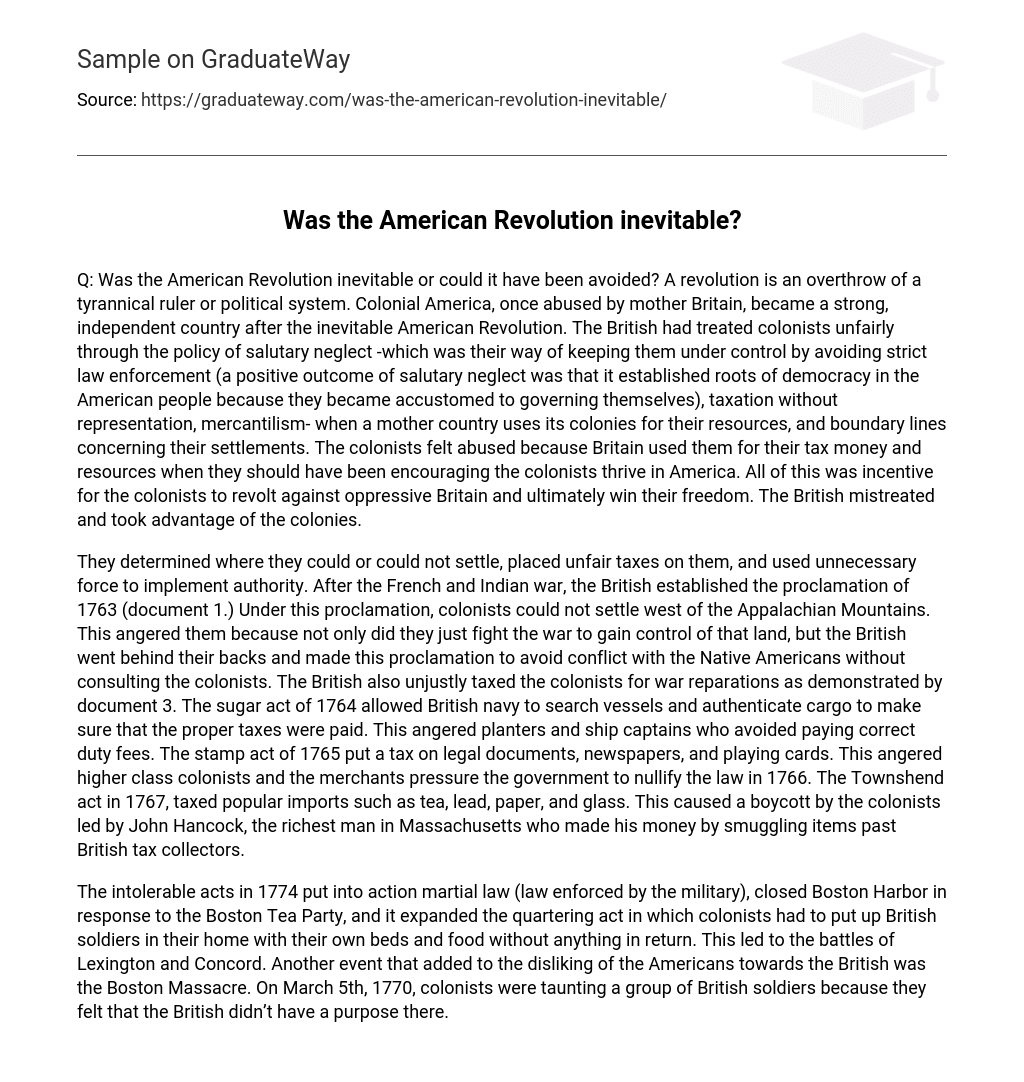A revolution is an overthrow of a tyrannical ruler or political system. Colonial America, once abused by mother Britain, became a strong, independent country after the inevitable American Revolution. The British had treated colonists unfairly through the policy of salutary neglect -which was their way of keeping them under control by avoiding strict law enforcement (a positive outcome of salutary neglect was that it established roots of democracy in the American people because they became accustomed to governing themselves), taxation without representation, mercantilism- when a mother country uses its colonies for their resources, and boundary lines concerning their settlements.
The colonists felt abused because Britain used them for their tax money and resources when they should have been encouraging the colonists thrive in America. All of this was incentive for the colonists to revolt against oppressive Britain and ultimately win their freedom. The British mistreated and took advantage of the colonies.
They determined where they could or could not settle, placed unfair taxes on them, and used unnecessary force to implement authority. After the French and Indian war, the British established the proclamation of 1763 (document 1.) Under this proclamation, colonists could not settle west of the Appalachian Mountains. This angered them because not only did they just fight the war to gain control of that land, but the British went behind their backs and made this proclamation to avoid conflict with the Native Americans without consulting the colonists.
The British also unjustly taxed the colonists for war reparations as demonstrated by document 3. The sugar act of 1764 allowed British navy to search vessels and authenticate cargo to make sure that the proper taxes were paid. This angered planters and ship captains who avoided paying correct duty fees. The stamp act of 1765 put a tax on legal documents, newspapers, and playing cards. This angered higher class colonists and the merchants pressure the government to nullify the law in 1766. The Townshend act in 1767, taxed popular imports such as tea, lead, paper, and glass. This caused a boycott by the colonists led by John Hancock, the richest man in Massachusetts who made his money by smuggling items past British tax collectors.
The intolerable acts in 1774 put into action martial law (law enforced by the military), closed Boston Harbor in response to the Boston Tea Party, and it expanded the quartering act in which colonists had to put up British soldiers in their home with their own beds and food without anything in return. This led to the battles of Lexington and Concord. Another event that added to the disliking of the Americans towards the British was the Boston Massacre. On March 5th, 1770, colonists were taunting a group of British soldiers because they felt that the British didn’t have a purpose there. They started throwing snowballs and rocks at the soldiers and in turn, the soldiers opened fire into an unarmed crowd, killing 5 colonists.
This event is portrayed by Paul Revere in document 4. The American Revolution was inevitable because the British were being unfair to the colonists and were not listening to what they had to say, forcing them to take military action. The British were not listening to the colonists and making their lives miserable. In turn, the colonists boycotted British goods and attempted to form a more democratic system. Document 5 is an illustration of the Boston Tea Party where colonists dressed up as Native Americans, boarded ships carrying tea and dumped one million dollars worth of tea into Boston Harbor.
This was in response to Britain giving the monopoly of tea sales to the East India Company without consulting the colonists first; this resulted in the intolerable acts. Document 6 depicts colonists tarring and feathering a British tax collector. They were doing this because they were agitated by all the new taxes and they took their anger out on the tax collectors.
Document 7 is an excerpt from the sons of liberty which states that anybody in possession of or caught hiding tea while it was still being taxed by the British, was an enemy to the colonies and would be shunned from society. Document 8 is from the First Continental Congress and explains everything the British are doing wrong or unfairly.
For example, the colonists say that Britain should repeal all the acts that raise taxes so much, complaints regarding the lack of trial by jury, and the seizure of ships without being allowed to defend their property. All of these documents express the colonists’ distaste for the British and prerevolutionary actions. Those who had neutral feelings towards the British may have been swayed by Thomas Paine’s Common Sense.
This 50 page pamphlet combined both logical and emotional arguments as to why colonists should become patriots and fight against the British. Thomas Jefferson wrote the Declaration of Independence in 1776, this document outlines all the things that the British did wrong and why America wanted its independence. The British obviously did not react well to this document and sent in troops to put the colonists back in their place. This was the start of the inevitable American Revolution.
In conclusion, while no one event can be blamed for the start of the American Revolution, the colonists had plenty reason to go up against the British. They were being treated poorly, taxed unfairly, and their cries for help were being ignored. The only things Britain did for its colonies were take their tax money and their resources. Britain’s hard headed ways were obscure and wrong, they treated colonists like they weren’t deserving of basic human rights and refused to help or listen to their grievances. This is what made the American Revolution inevitable.





